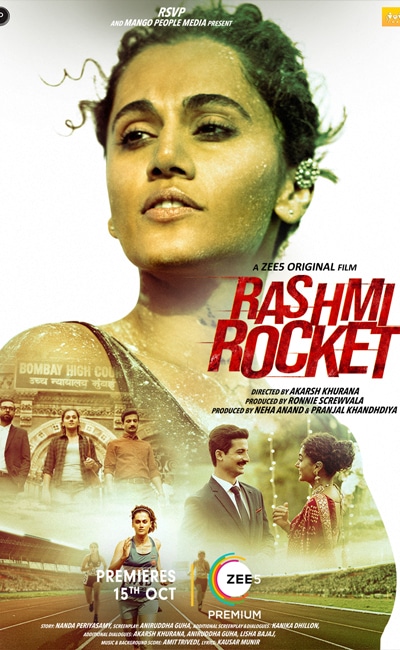
CAST: Taapsee Pannu, Priyanshu Painyuli, Abhishek Banerjee, Supriya Pathak, Supriya Pilgaonkar, Shweta Tripathi Sharma, Varun Badola, Mantra, Zafar Karachiwala
DIRECTOR: Akarsh Khurana
BLUF: Rashmi is a small-town girl who has an immense talent for running fast. In Bhuj, where there is a base for the Indian Army, she is friendly with a few officers. A new officer named Gagan spots her talent and mentors her to try for the nationals. This is the story of her success and how the politics in sports in India choose to dehumanize their most talented women athletes. It is inspired by the story of Dhutee Chand and many other such female athletes whose careers were affected by unscientific gender tests on their bodies administered by Sports Associations.
MEAT AND POTATOES:
No governing body has so tenaciously tried to determine who counts as a woman for the purpose of sports as the I.A.A.F. and the International Olympic Committee (I.O.C.). Those two influential organizations have spent a half-century vigorously policing gender boundaries. Their rationale for decades was to catch male athletes masquerading as women, though they never once discovered an impostor. Instead, the athletes snagged in those efforts have been intersex women — scores of them.
The treatment of female athletes, and intersex women, has a long and sordid history. For centuries, sport was the exclusive province of males, the competitive arena where masculinity was cultivated and proven. Sport endowed men with the physical and psychological strength that “manhood” required. As women in the late 19th century encroached on explicitly male domains — sport, education, paid labor — many in society became increasingly anxious; if a woman’s place wasn’t immutable, maybe a man’s role, and the power it entailed, were not secure either.
Well into the 20th century, women were discouraged from participating in sports. Some medical experts claimed that vigorous exercise would damage women’s reproductive capacity and their fragile emotional state and would make them muscular, “mannish” and unattractive to men. Critics fretted that athletics would unbind women from femininity’s modesty and self-restraint.
Rashmi is given a gender test to clear by a doctor under suspicious circumstances and made to take her clothes off for a CT. She is demeaned, media shamed, and ostracized by people in the association to defame and ban her.
Her strength is her boyfriend and later husband, who stands by her and becomes her cheerleader to fight back not only for herself but also for other female athletes who undergo this unscientific test that labels them male or female based on hormonal imbalance.
The logic is clear. When men athletes have unfair advantages- they are hailed, heroes. When female athletes may have an unfair advantage due to higher testosterone levels, they are banned from the games.
The movie presents the story of Rashmi in a very plausible manner, focusing on the aspects that needed to be spoken about and building the story extremely well.
IN THE KNOW
Gender tests for athletes are meant to identify competitors whose chromosomes, hormones, genitalia, reproductive organs, or secondary sex characteristics don’t develop or align in a typical way. Researchers estimate that between 1972 and 1990, sex-testing procedures disqualified approximately one in 504 elite athletes. An untold number of women competing at the lower levels of sport met a similar fate, or else abandoned competition altogether based on fears that they might not meet the standards for femaleness.
There were protests about the ethics, validity, and reliability of the tests. By the early 1990s, objections had reached a fever pitch and, in May 1992, the IAAF announced an end to systematic chromosomal testing. The IOC did the same in 1999. However, both organizations reserved the right to examine athletes if someone were to “challenge” their femaleness. The ostensibly progressive protocol ultimately discriminates against women who do not look or perform in accordance with certain “feminine” ideals. This is what happened to South African runner Caster Semenya in 2009 and to Dutee Chand in 2014.
Taapsee as Rashmi is not only the best fit but also you can see the hard work that the actor has put in her technique and demeanor to come off as a credible athlete.
The script is great and writers Nanda Periyasamy (story), Aniruddha Guha (screenplay), and Kanika Dhillon (additional screenplay and dialogues) deserve applause.
Priyanshu Painyuli plays Gagan with the endurance and the perfect body language of an Army man, He is perfect in his role. More of this actor, please.
Our favorite Abhishek Banerjee ( who we have loved in Stree, Dream Girl, Pataal Lok) for his screen presence and acting chops, makes it worth the while again.
He has the passion of an underdog and the way he portrays his nervousness or lack of prep keeps us guessing how he will tweak the stereotypical character. He does that will sass.
The story thankfully does not have any caricature themes and sticks to tight storytelling focusing on the important main storyline. It never wavers. For this, it’s a 100% credit to Akarsh Khurana, the director.
If only there was no song and dance sequence, this would’ve been the best thing since sliced bread.
The movie is a binge. Once you start you will want to see every frame. So this is a total outta park from the Zee stable.
The opening clearly states that the film is only “inspired by true events … a product of fictional writing”, so we will not treat this as a biopic that needs to tell a story closer to the story of the athlete that it is inspired by.
Taapsee is quintessentially pheno in the way she portrays the character, and this is her story all the way.
WHAT WE LOVED:
The entire cast
The story, screenplay
The tight narrative
WHAT WE MISSED:
Didn’t need the song in between




